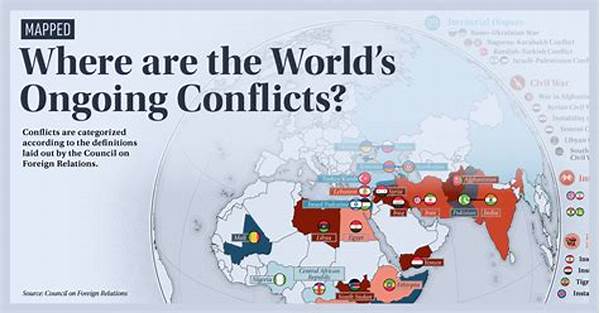In a globally connected world, the phenomenon of international military reactions to regional conflicts has become a subject of paramount importance. Nations across the globe increasingly find themselves intertwined within a complex web of relationships, obligations, and interests. This article explores how these interactions shape the global landscape and what drives nations to intervene or remain neutral in the face of regional conflicts.
The Dynamics of International Military Responses
International military reactions to regional conflicts are shaped by a myriad of factors, ranging from geopolitical interests, historical ties, to humanitarian concerns. When a regional conflict arises, countries may choose to react militarily based on strategic interests, alliances, and the potential impact on international stability. For instance, regional conflicts in the Middle East often draw military responses from Western powers due to the strategic importance of oil reserves and counter-terrorism efforts. Furthermore, nations with historical ties to a conflicted region may also feel morally obligated to intervene, offering support either through direct military involvement or logistical aid. The fabric of international relations is such that each military response can usher in a cascade of reactions and counter-reactions, potentially altering alliances and shaping new geopolitical landscapes. The complexity of these interactions underscores the critical nature of understanding international military reactions to regional conflicts for policy makers and global leaders alike.
Factors Influencing Military Intervention
1. Strategic Interests: International military reactions to regional conflicts are often determined by the strategic value of the region, including natural resources, geographic advantage, or political influence.
2. Alliances: Military alliances, such as NATO, play a crucial role, as member states commit to collective defense, which can trigger military responses to conflicts affecting allies.
3. Humanitarian Concerns: Human rights violations during regional conflicts can prompt international military reactions, motivated by a responsibility to protect civilian populations.
4. Economic Impacts: The global economy can be significantly affected by regional conflicts, influencing countries to react militarily to stabilize markets or protect financial interests.
5. International Law: Adherence to international law and treaties often guides military reactions, ensuring responses are justified and legally sanctioned within the framework of global governance.
The Role of Superpowers in Regional Conflicts
Superpowers play a pivotal role in shaping international military reactions to regional conflicts. Their vast resources and global influence enable them to wield significant military might or diplomatic pressure. The actions of countries like the United States, China, and Russia are particularly consequential, as their decisions often set precedents for other nations’ responses. These superpowers may choose to intervene directly through military force or indirectly by providing support to allied nations, thus impacting the balance of power within the region. Their involvement is often driven by both strategic interests and the desire to maintain or extend their influence. Moreover, the reactions of these countries are closely observed by the international community, as they can lead to escalations or de-escalations of conflicts. Hence, international military reactions to regional conflicts are often forecast by analyzing the stance and actions of these powerful nations.
Challenges in Predicting Military Responses
Anticipating international military reactions to regional conflicts poses significant challenges for analysts and diplomats. The unpredictability of political leaders, shifts in public opinion, and unforeseen developments on the ground can all lead to rapid changes in strategy. Furthermore, the complexity of regional conflicts, involving multiple parties with conflicting interests, adds another layer of uncertainty. In some cases, military intervention may be considered a last resort, while in others, it might emerge as the primary course of action. Analysts must also consider the legal, ethical, and political ramifications of military interventions, balancing the need for decisive action with the risks of unintended consequences. Hence, predicting international military reactions to regional conflicts demands a nuanced understanding of global politics, historical contexts, and emerging trends.
The Impact of Military Technology and Innovation
The advancement of military technology has significantly influenced international military reactions to regional conflicts. The development of precision weaponry, drones, and cyber capabilities allows for targeted interventions with reduced risk of collateral damage. Moreover, technological innovations facilitate better intelligence gathering and situational awareness, enabling more calculated responses. Countries equipped with advanced military technologies may opt for limited engagements, rather than full-scale invasions, thus altering traditional notions of military intervention. However, the proliferation of these technologies also raises concerns about escalation and the potential for conflict in cyberspace. International military reactions to regional conflicts must therefore accommodate the dual-edged nature of military technology, leveraging its benefits while mitigating its risks.
Implications for International Stability
International military reactions to regional conflicts have profound implications for global stability. While interventions can restore order and prevent humanitarian crises, they can also exacerbate tensions and lead to prolonged engagements. The moral and ethical implications of such actions necessitate a careful examination of objectives and outcomes. For policymakers, the challenge lies in crafting responses that align with national interests while supporting international peace and security. Multilateral cooperation and dialogue remain essential in ensuring that military interventions do not inadvertently ignite larger conflicts or undermine the legitimacy of international institutions. Understanding the intricacies of international military reactions to regional conflicts thus plays a crucial role in maintaining a stable and harmonious global order.
Conclusion
In conclusion, international military reactions to regional conflicts are multifaceted and deeply influenced by geopolitical dynamics, alliances, and technological advancements. The responses of nations, especially superpowers, to these conflicts not only shape the immediate outcomes but also have long-term implications for global stability. As military technology continues to evolve, and new political landscapes emerge, the ways in which countries react to regional conflicts will also adapt. Understanding these complexities remains critical for policymakers and international leaders striving to maintain peace and prevent escalating conflicts. The future will undoubtedly present new challenges and opportunities in the realm of international military responses, demanding ongoing vigilance, strategic foresight, and cooperation on the global stage.





